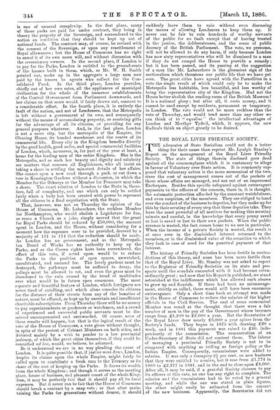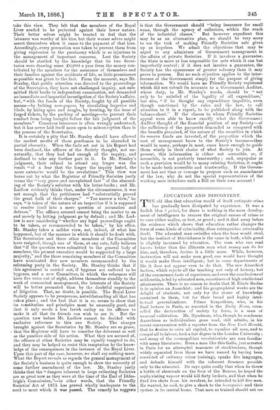THE ROYAL LIVER FRIENDLY SOCIETY.
THE advocates of State Socialism could not do a better thing for their cause than reprint Mr. Lyulph Stanley's Report on the management of the Royal Liver Friendly Society. The state of things therein disclosed goes dead against all the commonplaces which it is customary to allege
in favour of Voluntary over State action. It is commonly sup- posed that voluntary action is the more economical of the two, since the cost of management comes out of the pockets of those whose affairs are managed, and not out of an impersonal Exchequer. Besides this specific safeguard against extravagant payments to the officers of the concern, there is, it is thought, the automatic protection afforded by the constant watchfulness, and even suspicion, of the members. They are obliged to hand over the conduct of the business to deputies, but they make up for this by their scrutiny of every step that these deputies take. They have the most powerful of all motives for making this scrutiny minute and careful, in the knowledge that every penny saved or lost is saved or lost to their own pockets. When the public revenue is wasted, the fact comes home to no one in particular. When the income of a private Society is wasted, the result is at once seen in the diminished interest returned to the members, or in the diminished value of the securities to which they look in case of need for the punctual payment of that interest.
The history of Friendly Societies has been fertile in contra- dictions of this theory, and none has been more fertile than that of the Royal Liver. Mr. Stanley was not asked to report to the Registrar of Friendly Societies on its state and pro- spects until the scandals connected with it had become extra- ordinarily great ; and now that his Report is published, we stand astonished at the indifference which has allowed such abuses to grow up and flourish. If there had been no mismanage- ment. strictly so called, there would still have been enormous extravagance. Only a short time back an attempt was made in the House of Commons to reduce the salaries of the higher officials in the Civil Service. The soul of some economical Member was vexed at the thought that there were a fair number of men in the pay of the Government whose incomes range from £1,200 to £2,000 a year. But the Secretaries of the Royal Liver drew nearly £6,000 a year apiece from the Society's funds. They began in 1875 with drawing £20 a week, and in 1881 this payment was raised to £40, inde- pendently of the commission. The remuneration of an Under-Secretary of State did not content them. The labour of managing a provincial Friendly Society is not to be compared with anything so trifling as foreign policy or the Indian Empire. Consequently, commissions were added to salaries. It was only a trumpery 24,- per cent, on new business that they were entitled to receive, but it rose from £1,774 in 1880 to £2,277 in 1881, and in the end to close upon £4,000. After all, it may be said, if a grateful Society chooses to pay its officers at this rate, no one has any right to complain. The salaries an I the commissions had to be voted by a general meeting, and while the one was stated in plain figures, the other might easily be estimated from the amount of the new business. Apparently, the Secretaries did not
take this view. They felt that the members of the Royal Liver needed to be prctected against their lower nature. Their better selves might be trusted to feel that the labourer was worthy of his hire, but their worser selves might assert themselves when it came to the payment of that hire. Accordingly, every precaution was taken to prevent them from giving expression to the parsimony which is so injurious in the management of important concerns. Lest the Society should be startled by the knowledge that its two Secre- taries were drawing some £6,000 a year from the money con- tributed by the members for the assurance of themselves and their families against the accidents of life, as little prominence as possible was given to the fact. From the moment, says Mr. Stanley, that public attention was directed to the proceedings of the Secretaries, they have not challenged inquiry, not sub- mitted their-books to independent examination, not demanded an immediate and impartial investigation of the Society's affairs, but, "with the funds of the Society, fought by all possible means—by bribing newspapers, by circulating forgeries and libels, by hiring spies and roughs, by treating, by the issue of forged tickets, by the packing of meetings—to prevent their conduct from being brought before the fair judgment of the members." Conscious innocence is often wrongly understood, but it has never laid itself more open to misconception than in the persons of the Secretaries.
It is certainly a pity that Mr. Stanley should have allowed the modest merits of these gentlemen to be shrouded in partial obscurity. When the facts set out in his Report had been disclosed, the officers of the Society thought, not un- naturally, that they had had enough of the inquiry, and declined to take any further part in it. In Mr. Stanley's judgment, their refusal to attend any longer was the result "of a fear that the longer the inquiry lasted, the more extensive would be the revelations." This view was borne out by what the Registrar of Friendly Societies justly terms the "very grave and unexplained fact" of the abscond- ing of the Society's solicitor with his letter-books ; and Mr. Ludlow evidently thinks that, under the circumstances, it was not enough that the petitioners had "substantially proved the great bulk of their charges." "Too narrow a view," he says, "is taken of the nature of an inspection if it is supposed to resolve itself into a mere question of accusation and defence." The officers accused cannot bring the matter to an end merely by letting judgment go by default ; and Mr. Lud- low is now considering "whether any legal proceedings ought to be taken, or recommended to be taken," by his office. Mr. Stanley takes a milder view, not, indeed, of what has happened, but of the manner in which it should be dealt with. The Secretaries and three other members of the Committee have resigned, though one of them, at any rate, fully believes that "if the question were submitted to the general body of members, the present executive would be supported by a large majority," and the three remaining members of the Committee have nominated five new members recommended by the reforming party in the Society. Mr. Stanley thinks that if this agreement is carried out, if bygones are suffered to be bygones, and a new Committee, in which the reformers will have five votes out of eight, address themselves steadily to the work of economical management, the interests of the Society will be better promoted than by the doubtful experiment of litigation. That, no doubt, is possible. The Royal Liver Scciety appears to be prosperous, notwithstanding all that has taken place ; and the fact that it is so, seems to show that its constitution and principles must be unusually good, and that it only needs a less lavish outlay on its officers to make it all that its friends can wish to see it. But the question now before Mr. Ludlow cannot be decided with exclusive reference to this one Society. The charges brought against the Secretaries by Mr. Stanley are so grave, • that the Registrar will have to consider the deterrent as well as the punitive side of his action. What they are accused of, the officers of other Societies may be equally tempted to do, and they may be helped to resist this temptation by the know- ledge of the consequences in the instance of the Royal Liver. Upon this part of the case, however, we shall say nothing more. What the Report reveals as regards the general management of the Society's business is quite enough to show the necessity of some further amendment of the law. Mr. Stanley justly thinks that the "dangers inherent in large collecting Societies are as great now as they were at the time of the Earl of Iddes- leigh's Commission,"—in other words that the Friendly Societies' Act of 1875 has proved wholly inadequate to the need to meet which it was passed. The remedy he suggests
is that the Government should "bring insurance for small sums, through the agency of collectors, within the reach of the industrial classes." But however expedient this may be as an alternative plan, we should be very sorry to see the task of making Friendly Societies safe given up as hopeless. We admit the objections that may be urged to any admixture of Government management in the affairs of private Societies. If it involves a guarantee, the State is more or less responsible for acts which it can but imperfectly control ; if it does not involve a guarantee, the Society has the appearance of greater solvency than it may prove to possess. But no such objection applies to the inter- ference of the Government simply for the purpose of giving information. We would have no Friendly Society registered which did not submit its accounts to a Government Auditor, whose duty, in Mr. Stanley's words, should be " not only to be satisfied of the legality of all expenditure," but also, if he thought any expenditure impolitic, even though sanctioned by the rules and the law, to call attention to it in a report, to be published along with the balance-sheet." If the classes to whom Friendly Societies appeal were able to know exactly what the Government Auditor thought of the financial position of any Society—of the sufficiency of the payments demanded as compared with the benefits promised, of the nature of the securities in which its reserve funds are invested, of the proportion which the cost of management bears to the Society's income—they would in many, perhaps in most, cases know enough to guide them wisely in their choice of what Society to join. At present, this information is either not accessible, or, if accessible, is not perfectly trustworthy ; and, unpopular as such a provision would be to many existing Societies, it ought to be made both accessible and trustworthy. If the Govern- ment has not time or courage to propose such an amendment of the law, why do not the special representatives of the working men introduce such a Bill on their own account ?







































 Previous page
Previous page